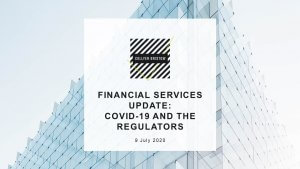- Banking & financial disputes
- Financial services

Longer Reads
The new FCA consumer duty
Head of Dispute Resolution Robin Henry and Associate Abbie Coleman comment on the new consumer duty which came into force on 31 July 2023.
4 minute read
Published 16 August 2023
Key information
From 31 July 2023, the new Consumer Duty applies to all new and existing regulated financial products or services that are open to sale and renewal. This will extend to closed products or services from 31 July 2024. The new duty comes as a ‘package’ which includes a new FCA principle, cross-cutting rules and four specific outcomes.
The FCA states this will set “higher and clearer standards of consumer protection across financial services” and “requires firms to put their customers’ needs first”.
The new duty applies to retail customers. The definition of “retail customer” generally accords with the FCA Handbook and varies across different regulated sectors but as far as investments are concerned, it includes any customer of an FCA regulated firm who does not hold themselves out to be a professional regulated by the FCA.
The New Consumer Principle
The FCA Principles for Business already required that (6) “a firm must pay due regard to the interests of its customers and treat them fairly” and (7) “a firm must pay due regard to the information needs of its clients and communicate information to them in a way which is clear, fair and not misleading”.
These two principles will now be disapplied for retail business (only) and a new Consumer Principle (12) introduced: “a firm must act to deliver good outcomes for retail customers”. This is intended to be a higher bar to meet.
Cross-Cutting Rules
The FCA will also introduce cross-cutting rules, or behaviours, which require firms to:
– act in good faith towards retail customers;
– take reasonable steps to avoid foreseeable harm; and
– enable and support retail customers to pursue their financial objectives.
Where investment products/services are inherently high risk, provided a firm reasonably believes a customer understands and accepts the inherent risk, it will not breach the rule of avoiding foreseeable harm if it fails to prevent such a risk from occurring. But again, this will need to be evidenced – meaning evidence of clear and sufficiently detailed communication.
Firms are not required to always guarantee/provide a ‘good outcome’ – this would be an impossible standard particularly given the unpredictability of financial markets. But they are required to act in such a way to ensure the best chance of delivering a good outcome. So, if they can evidence that they have taken all reasonable steps to achieve the Four Objectives (below) and that they’ve acted in good faith, that should be sufficient even where an unforeseen event results in an objectively ‘bad’ financial outcome for the retail customer.
The Four Outcomes
The FCA have set out key elements of the firm-consumer relationship that are necessary to achieve the overarching Consumer Principle:
1. Communications Outcome: communications which equip consumers to make effective, timely and properly informed decisions about financial products and services.
2. Products and Services Outcome: products and services which are specifically designed to meet the needs of consumers and are sold to consumers who have those needs.
3. Customer Service Outcome: customer service which meets the needs of consumers, enabling them to realise the benefits of products and services and act in their interests without undue hinderance.
4. Price and Value Outcome: the price of products and services represents fair value for consumers.
There will be an expectation that (i) firms amend their current practice/approach as necessary to achieve these four outcomes, (ii) that there is ongoing monitoring of the same by the firm and (iii) that the four outcomes can be clearly evidenced. There is a requirement for boards to regularly (at least annually) review an assessment of whether the firm is delivering good outcomes for its customers.
This expectation encourages firms to utilise the data and intelligence they have, to improve their services and better understand the outcomes they’re achieving for their customers. The FCA expects firms to drill down into the root causes of poor outcomes and address the risks as appropriate. Again, the type of data firms gather is down to their judgment, but a widely applicable example would be customer feedback.
How will the FCA clarify these, currently vague, regulations?
The FCA has released several podcasts and speeches on their website[1] and attended on the Treasury Committee on 19 July 2023 (available to view)[2]. However, instead of providing much clarity, the take-home message for firms seems to be ‘use your own judgment’.
For example, when posed with the question “what does good look like?” in the context of outcomes monitoring, FCA Head of Competition Policy (Ed Smith) confirmed that it would depend on the context, including the size of the firm, the client base and the products and services that firm supplies[3].
Nikhil Rathi, Chief Executive of the FCA, expressed the new regulations as a ‘change in philosophy’ to regulation, and a move to an outcome-focussed approached[4]. This, combined with the very diverse nature of retail customer needs across the sector, makes it unlikely that any substantively detailed guidance that ‘fits all’ will be produced by the FCA.
Does the Consumer Duty apply to the whole distribution chain, even to firms which do not sell to the customer?
In short, yes. “The duty applies across the distribution chain, including all firms involved in the manufacture, provision, sale and ongoing administration and management of a product or service to the end retail customer”[5].
Generally, when firms outsource activities to third parties, they remain responsible for compliance with the FCA rules (including the new Consumer Duty). This means that:
– Before outsourcing, a firm will need to consider the impact of such third-party involvement on retail customer outcomes.
– Arrangements will then need to be put in place which enables firms to capture data from the third-party outsourcer that relates to customer outcomes, as both the outsourcer and third party will need to demonstrate good outcomes.
– Where a firm can reasonably foresee harm to a retail customer it should act where it can and raise any issues with other relevant parties.
– If a firm becomes aware that another firm within the distribution chain may not be complying with the Consumer Duty, there is an obligation to notify the FCA.
However, the Consumer Duty does not make firms responsible for the activities of others. Every firm subject to FCA regulation is responsible for its own compliance with the Consumer Duty.
Consequences of non-compliance?
Lessons from previous regulatory changes suggest the FCA will look unfavourably on firms failing to commit sufficient resources to implementation of the Consumer Duty package. The FCA has confirmed that once the duty is in force it will prioritise the most serious breaches and act swiftly and assertively where it finds evidence of harm or risk of harm to consumers[6], and that where it identifies “serious misconduct” it will use its full powers including remedial and deterrent powers such as issuing fines and securing redress for harmed customers[7].
The FCA has set out 10 key questions that firms should have been considering in advance of the 31 July 2023 deadline, and which they must continue to consider throughout their dealings with retail customers: One month to go for the Consumer Duty | FCA .
Purely a regulatory matter, or does this provide private rights of action?
One important point to note about the Consumer Duty is that the FCA will not, at least for now, introduce a private right of action for breaches of the Consumer Duty. Breaches can currently only be enforced and/or punished by the FCA themselves. However, the FCA does have the power to create a private right of action in relation to a breach of its principles and they are keeping the matter under review.
Conclusion
Intended to be a significant shift in approach within the financial sector, the new Consumer Duty seeks to provide heightened protection for retail customers. Substantial guidance for firms has been published by the FCA, but due to the outcomes-focussed approach there necessarily must be a degree of discretion and judgment on the part of firms as to how this Consumer Duty applies to their services/products and end-users. It will be key to take up the offer of support from the FCA in implementing the new duty, and to keep an eye out for any reported enforcement action which will offer clarity on FCA expectations within more specific firm-consumer relationships.
For more information, visit our Banking & Financial Disputes page
Sources:
[1] Consumer Duty | FCA
[2] Parliamentlive.tv – Treasury Committee
[3] https://www.fca.org.uk/multimedia/inside-fca-podcast-explaining-consumer-duty-outcomes-monitoring
[4] https://parliamentlive.tv/Event/Index/94b4afeb-7201-4735-9ac5-f340d97d1d8a
[5] FCA FG22/5 Final non-Handbook Guidance for firms on the Consumer Duty, paragraph 2.12.
[6] One month to go for the Consumer Duty | FCA
[7] PS22/9 A New Consumer Duty Feedback to CP21/36 and final rules, page 82.
Related content
Longer Reads
The new FCA consumer duty
Head of Dispute Resolution Robin Henry and Associate Abbie Coleman comment on the new consumer duty which came into force on 31 July 2023.
Published 16 August 2023
Associated sectors / services
Authors
From 31 July 2023, the new Consumer Duty applies to all new and existing regulated financial products or services that are open to sale and renewal. This will extend to closed products or services from 31 July 2024. The new duty comes as a ‘package’ which includes a new FCA principle, cross-cutting rules and four specific outcomes.
The FCA states this will set “higher and clearer standards of consumer protection across financial services” and “requires firms to put their customers’ needs first”.
The new duty applies to retail customers. The definition of “retail customer” generally accords with the FCA Handbook and varies across different regulated sectors but as far as investments are concerned, it includes any customer of an FCA regulated firm who does not hold themselves out to be a professional regulated by the FCA.
The New Consumer Principle
The FCA Principles for Business already required that (6) “a firm must pay due regard to the interests of its customers and treat them fairly” and (7) “a firm must pay due regard to the information needs of its clients and communicate information to them in a way which is clear, fair and not misleading”.
These two principles will now be disapplied for retail business (only) and a new Consumer Principle (12) introduced: “a firm must act to deliver good outcomes for retail customers”. This is intended to be a higher bar to meet.
Cross-Cutting Rules
The FCA will also introduce cross-cutting rules, or behaviours, which require firms to:
– act in good faith towards retail customers;
– take reasonable steps to avoid foreseeable harm; and
– enable and support retail customers to pursue their financial objectives.
Where investment products/services are inherently high risk, provided a firm reasonably believes a customer understands and accepts the inherent risk, it will not breach the rule of avoiding foreseeable harm if it fails to prevent such a risk from occurring. But again, this will need to be evidenced – meaning evidence of clear and sufficiently detailed communication.
Firms are not required to always guarantee/provide a ‘good outcome’ – this would be an impossible standard particularly given the unpredictability of financial markets. But they are required to act in such a way to ensure the best chance of delivering a good outcome. So, if they can evidence that they have taken all reasonable steps to achieve the Four Objectives (below) and that they’ve acted in good faith, that should be sufficient even where an unforeseen event results in an objectively ‘bad’ financial outcome for the retail customer.
The Four Outcomes
The FCA have set out key elements of the firm-consumer relationship that are necessary to achieve the overarching Consumer Principle:
1. Communications Outcome: communications which equip consumers to make effective, timely and properly informed decisions about financial products and services.
2. Products and Services Outcome: products and services which are specifically designed to meet the needs of consumers and are sold to consumers who have those needs.
3. Customer Service Outcome: customer service which meets the needs of consumers, enabling them to realise the benefits of products and services and act in their interests without undue hinderance.
4. Price and Value Outcome: the price of products and services represents fair value for consumers.
There will be an expectation that (i) firms amend their current practice/approach as necessary to achieve these four outcomes, (ii) that there is ongoing monitoring of the same by the firm and (iii) that the four outcomes can be clearly evidenced. There is a requirement for boards to regularly (at least annually) review an assessment of whether the firm is delivering good outcomes for its customers.
This expectation encourages firms to utilise the data and intelligence they have, to improve their services and better understand the outcomes they’re achieving for their customers. The FCA expects firms to drill down into the root causes of poor outcomes and address the risks as appropriate. Again, the type of data firms gather is down to their judgment, but a widely applicable example would be customer feedback.
How will the FCA clarify these, currently vague, regulations?
The FCA has released several podcasts and speeches on their website[1] and attended on the Treasury Committee on 19 July 2023 (available to view)[2]. However, instead of providing much clarity, the take-home message for firms seems to be ‘use your own judgment’.
For example, when posed with the question “what does good look like?” in the context of outcomes monitoring, FCA Head of Competition Policy (Ed Smith) confirmed that it would depend on the context, including the size of the firm, the client base and the products and services that firm supplies[3].
Nikhil Rathi, Chief Executive of the FCA, expressed the new regulations as a ‘change in philosophy’ to regulation, and a move to an outcome-focussed approached[4]. This, combined with the very diverse nature of retail customer needs across the sector, makes it unlikely that any substantively detailed guidance that ‘fits all’ will be produced by the FCA.
Does the Consumer Duty apply to the whole distribution chain, even to firms which do not sell to the customer?
In short, yes. “The duty applies across the distribution chain, including all firms involved in the manufacture, provision, sale and ongoing administration and management of a product or service to the end retail customer”[5].
Generally, when firms outsource activities to third parties, they remain responsible for compliance with the FCA rules (including the new Consumer Duty). This means that:
– Before outsourcing, a firm will need to consider the impact of such third-party involvement on retail customer outcomes.
– Arrangements will then need to be put in place which enables firms to capture data from the third-party outsourcer that relates to customer outcomes, as both the outsourcer and third party will need to demonstrate good outcomes.
– Where a firm can reasonably foresee harm to a retail customer it should act where it can and raise any issues with other relevant parties.
– If a firm becomes aware that another firm within the distribution chain may not be complying with the Consumer Duty, there is an obligation to notify the FCA.
However, the Consumer Duty does not make firms responsible for the activities of others. Every firm subject to FCA regulation is responsible for its own compliance with the Consumer Duty.
Consequences of non-compliance?
Lessons from previous regulatory changes suggest the FCA will look unfavourably on firms failing to commit sufficient resources to implementation of the Consumer Duty package. The FCA has confirmed that once the duty is in force it will prioritise the most serious breaches and act swiftly and assertively where it finds evidence of harm or risk of harm to consumers[6], and that where it identifies “serious misconduct” it will use its full powers including remedial and deterrent powers such as issuing fines and securing redress for harmed customers[7].
The FCA has set out 10 key questions that firms should have been considering in advance of the 31 July 2023 deadline, and which they must continue to consider throughout their dealings with retail customers: One month to go for the Consumer Duty | FCA .
Purely a regulatory matter, or does this provide private rights of action?
One important point to note about the Consumer Duty is that the FCA will not, at least for now, introduce a private right of action for breaches of the Consumer Duty. Breaches can currently only be enforced and/or punished by the FCA themselves. However, the FCA does have the power to create a private right of action in relation to a breach of its principles and they are keeping the matter under review.
Conclusion
Intended to be a significant shift in approach within the financial sector, the new Consumer Duty seeks to provide heightened protection for retail customers. Substantial guidance for firms has been published by the FCA, but due to the outcomes-focussed approach there necessarily must be a degree of discretion and judgment on the part of firms as to how this Consumer Duty applies to their services/products and end-users. It will be key to take up the offer of support from the FCA in implementing the new duty, and to keep an eye out for any reported enforcement action which will offer clarity on FCA expectations within more specific firm-consumer relationships.
For more information, visit our Banking & Financial Disputes page
Sources:
[1] Consumer Duty | FCA
[2] Parliamentlive.tv – Treasury Committee
[3] https://www.fca.org.uk/multimedia/inside-fca-podcast-explaining-consumer-duty-outcomes-monitoring
[4] https://parliamentlive.tv/Event/Index/94b4afeb-7201-4735-9ac5-f340d97d1d8a
[5] FCA FG22/5 Final non-Handbook Guidance for firms on the Consumer Duty, paragraph 2.12.
[6] One month to go for the Consumer Duty | FCA
[7] PS22/9 A New Consumer Duty Feedback to CP21/36 and final rules, page 82.
Associated sectors / services
- Banking & financial disputes
- Financial services
Authors
Need some more information? Make an enquiry below.
Subscribe
Please add your details and your areas of interest below
Article contributors
Robin
HenryPartner - Head of Dispute Resolution Services
Specialising in Banking & financial disputes, Commercial disputes, Corporate recovery, restructuring & insolvency, Financial regulatory and Personal insolvencyAbbie
ColemanAssociate
Specialising in Banking & financial disputes, Commercial disputes, Contentious trusts & probate and Corporate recovery, restructuring & insolvency
Enjoy reading our articles? why not subscribe to notifications so you’ll never miss one?
Subscribe to our articlesMessage us on WhatsApp (calling not available)
Please note that Collyer Bristow provides this service during office hours for general information and enquiries only and that no legal or other professional advice will be provided over the WhatsApp platform. Please also note that if you choose to use this platform your personal data is likely to be processed outside the UK and EEA, including in the US. Appropriate legal or other professional opinion should be taken before taking or omitting to take any action in respect of any specific problem. Collyer Bristow LLP accepts no liability for any loss or damage which may arise from reliance on information provided. All information will be deleted immediately upon completion of a conversation.
Close





































































